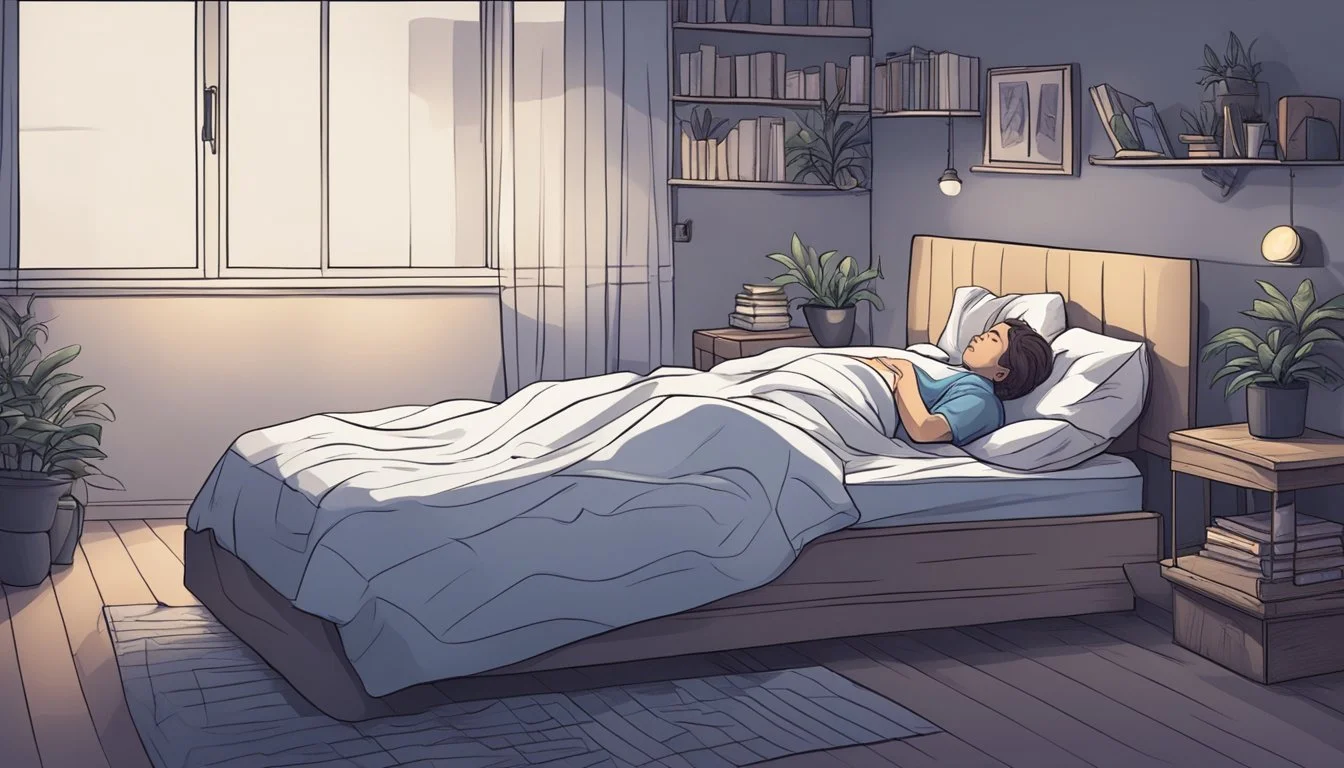11 Tips for Coping with PTSD-Related Insomnia
Effective Strategies for Better Sleep
Post-Traumatic Stress Disorder (PTSD) significantly impacts an individual’s ability to sleep, causing not just physical fatigue but also mental and emotional strain. People grappling with PTSD often face persistent insomnia, making it crucial to explore effective strategies for better sleep.
How can one manage PTSD-related insomnia to improve sleep quality and overall well-being? This article gathers 11 practical tips to help those affected by PTSD achieve restful nights and rebuild their daily lives. Understanding and addressing the connection between trauma and sleep disturbances is essential for long-term recovery and resilience.
1) Create a Bedtime Routine
Establishing a consistent bedtime routine can be crucial for those dealing with PTSD-related insomnia. A regular routine signals to the body that it is time to wind down and prepare for sleep. This can help in creating a more predictable sleep pattern, reducing the unpredictability often associated with PTSD.
Adopt calming activities before bed. Reading a book, taking a warm bath, or practicing mindfulness exercises can be beneficial. Avoid stimulating activities like watching TV or checking your phone, as these can keep the brain active and interfere with the ability to fall asleep.
It's also important to keep a regular sleep schedule. Going to bed and waking up at the same time every day helps regulate the internal body clock. This consistency is particularly important for those suffering from PTSD since it provides a sense of structure and predictability.
Creating an environment conducive to sleep is another key aspect. Keep the bedroom cool, dark, and quiet, and reserve the bed for sleep and intimacy only. This can help in associating the bed with restful activities and reducing anxiety associated with bedtime.
For those struggling with night-wakings, setting an alarm just before the usual time of waking can disrupt negative sleep patterns. This practice can help establish a more regular sleep routine and prevent the recurrence of disruptive waking episodes.
2) Avoid caffeine and alcohol
Caffeine can significantly disrupt sleep patterns, especially for those with PTSD-related insomnia. It can stay in the body for hours, leading to difficulties falling and staying asleep. Reducing or eliminating caffeine intake, especially later in the day, can help promote better sleep.
Alcohol might initially induce drowsiness, but it can interfere with the deeper stages of sleep. This disruption typically leads to poorer sleep quality, contributing to increased insomnia symptoms over time.
Both caffeine and alcohol can increase anxiety symptoms, which can exacerbate PTSD. Reducing these substances in your diet can lead to calmer nights and a more restful sleep environment. Avoiding stimulants and sedatives is key to managing PTSD-related sleep problems effectively.
Many people may not realize how pervasive caffeine is, as it’s found in coffee, tea, soda, and chocolate. Being mindful of these sources throughout the day can help manage intake and mitigate negative effects on sleep.
Moderation and timing are crucial. If eliminating caffeine and alcohol entirely is not feasible, try limiting consumption to earlier in the day. This strategy can still mitigate their impact on sleep quality.
3) Practice Relaxation Techniques
Relaxation techniques can play a significant role in managing PTSD-related insomnia. Deep breathing exercises, like inhaling slowly through the nose, holding briefly, and exhaling through the mouth, can help calm the nervous system.
Progressive muscle relaxation is another method. It involves tensing muscle groups for about five seconds and then releasing the tension for around 30 seconds. Starting from the head and working down to the toes, this technique fosters physical and mental relaxation.
Guided imagery or visualization involves creating mental images of peaceful and calming places. This method can help shift the focus away from stress and anxiety, making it easier to fall asleep.
In conjunction with these techniques, activities such as yoga and meditation can also prove beneficial. These practices not only assist in physical relaxation but also enhance mindfulness, which can alleviate the distress associated with PTSD.
Implementing these methods consistently can help reduce the frequency and severity of insomnia. With practice, these techniques become more effective and can significantly improve overall sleep quality for those dealing with PTSD.
4) Consider Cognitive Behavioral Therapy
Cognitive Behavioral Therapy (CBT) is a proven method for managing insomnia related to PTSD. It involves identifying and changing negative thought patterns that may contribute to sleeplessness.
CBT focuses on the connection between thoughts, feelings, and behaviors. By addressing these areas, individuals can achieve better sleep quality.
Sessions typically involve working with a therapist to reframe harmful thought processes. This can lead to healthier behaviors and improved emotion regulation.
Studies have shown CBT can reduce symptoms of PTSD, including insomnia. It is often a short-term therapy, with 12-20 sessions being common.
For those struggling with PTSD-related insomnia, CBT for PTSD is a viable option to explore. It equips individuals with coping skills to handle their trauma-related sleep issues more effectively.
5) Limit Screen Time Before Bed
Reducing screen time before bed can improve sleep quality. Exposure to blue light from phones, tablets, and computers can interfere with the production of melatonin, the hormone responsible for regulating sleep.
To mitigate this, it's advisable to turn off all electronic devices at least 30 minutes before bedtime. This allows the brain to wind down naturally and prepares the body for sleep.
Another effective strategy is to set a nightly routine that excludes screen use. Reading a physical book or practicing relaxation techniques like meditation can be helpful alternatives.
Studies have shown that limiting screen time before bed can lead to better sleep outcomes. Many people find that reducing their exposure to electronic devices helps them fall asleep faster and enjoy a more restful night.
Limiting screen time is particularly crucial for individuals with PTSD-related insomnia. Creating an electronic-free environment can help reduce anxiety and promote better sleep habits. For more details, refer to the findings on PTSD and Insomnia: Coping Strategies.
6) Try Sleep-Friendly Snacks
Certain foods can promote better sleep and may help alleviate insomnia caused by PTSD. Small snacks containing tryptophan, an amino acid that helps produce serotonin and melatonin, are particularly effective.
For instance, a handful of almonds could be beneficial. They contain both magnesium and tryptophan, which support muscle relaxation and sleep regulation. Pair this with a small piece of cheese for a protein kick.
Another great option is a banana. Bananas are rich in potassium and magnesium, which can aid muscle relaxation. Additionally, they contain carbohydrates that might help make tryptophan more available to the brain.
Tart cherry juice is another sleep booster. It is one of the few natural sources of melatonin, a hormone that regulates sleep-wake cycles. A small glass of this juice can be included in the bedtime routine.
Whole grain crackers with hummus can also be a good choice. Whole grains help produce insulin, which assists tryptophan in entering the brain. Hummus, made from chickpeas, adds a dose of protein and keeps blood sugar levels stable.
Even a simple glass of warm milk can do the trick. Milk contains tryptophan and calcium, which helps the brain use this amino acid effectively.
Choosing the right snacks before bedtime might not solve insomnia completely but can certainly contribute to creating a sleep-friendly environment.
7) Optimize your bedroom environment
Optimizing the bedroom can significantly improve sleep for those dealing with PTSD-related insomnia. Ensure the room is cool, dark, and quiet to create an environment conducive to rest.
Consider using blackout curtains to block external light and white noise machines to reduce disruptive sounds. A comfortable mattress and pillows can also make a big difference in sleep quality.
Removing electronic devices from the bedroom, such as TVs and smartphones, helps to limit distractions. These devices can emit blue light, which interferes with the production of melatonin, a hormone that regulates sleep.
Keep the bedroom reserved for sleep and intimate activities only. This reinforces a mental association between the bedroom and restful sleep, making it easier to unwind at night.
Using calming colors and keeping the space clutter-free can also have a positive impact. An organized and tranquil space reduces stress and helps the mind to relax before bedtime.
Including pleasant scents like lavender through essential oils or pillow sprays can create a soothing atmosphere. Aromatherapy is known to help ease anxiety and promote relaxation.
8) Use a weighted blanket
A weighted blanket can provide comfort and relief for those dealing with PTSD-related insomnia. This type of blanket adds gentle, even pressure to the body, which can help reduce anxiety and promote relaxation. Many people find the sensation similar to a comforting hug, which can make falling asleep easier.
Weighted blankets come in various weights and sizes. A common recommendation is to choose a blanket that is approximately 10% of the user's body weight. Individuals with PTSD might prefer a slightly lighter option to avoid any feelings of being trapped or claustrophobic. For example, a 15lb weighted blanket may be suitable for most adults.
Using a weighted blanket can also help during therapy sessions. Therapists have observed that clients feel more regulated and calm when a weighted blanket is laid over them, potentially leading to more productive sessions. This practice is not limited to PTSD; it can also help individuals with autism, ADHD, and insomnia.
When integrating a weighted blanket into the bedtime routine, it's important to ensure that it is comfortable and not too heavy. Overly heavy blankets can create discomfort and disrupt sleep rather than enhance it. Therefore, starting with a lighter blanket and gradually increasing the weight may be beneficial.
9) Record a sleep diary
Keeping a sleep diary can provide valuable insights into sleep patterns and habits. It helps track factors that influence sleep and can identify potential triggers for insomnia.
Include information about the time you go to bed, the time you wake up, and any periods of wakefulness during the night. Note how rested you feel upon waking.
Document any activities before bedtime, like screen time, caffeine intake, or exercise. Recording these details helps identify any habits that may disrupt sleep.
A sleep diary also fosters a better discussion with healthcare providers. By presenting concrete data, they can offer more tailored advice and treatment options.
Using tools like a digital sleep diary app can simplify the process. The Sleep Foundation provides resources to get started.
Reflecting on this information can empower you to make informed changes and improve sleep quality.
10) Engage in Gentle Exercise
Gentle exercise can significantly improve sleep quality for individuals managing PTSD-related insomnia.
Activities like walking, yoga, and tai chi provide physical benefits without overexertion. These exercises help reduce stress and anxiety, key factors that contribute to insomnia.
Regular gentle exercise regulates the body’s internal clock, promoting a more consistent sleep schedule. It also increases endorphin levels, helping to elevate mood.
It's important to avoid intense workouts close to bedtime as they can have the opposite effect. Instead, opt for calming exercises that prepare the mind and body for sleep.
Incorporating short sessions of gentle exercise into a daily routine can make a noticeable difference. Even 20-30 minutes a day can help manage symptoms of PTSD and improve sleep patterns.
For those new to exercise, starting slowly and gradually increasing intensity is advised. Consulting with a healthcare professional can also ensure that the chosen activities are appropriate.
Engaging in gentle exercise not only aids in better sleep but also contributes to overall physical and mental well-being.
11) Utilize Aromatherapy
Aromatherapy can be a helpful tool for those dealing with PTSD-related insomnia. Essential oils like lavender, chamomile, and bergamot have properties that promote relaxation and improve sleep quality.
Lavender oil is known for its calming effects. Utilizing a lavender-scented diffuser or pillow spray before bedtime may help in reducing anxiety and facilitating sleep.
Chamomile oil can also be beneficial. It is reputed for its soothing properties, offering a gentle way to ease the mind. Adding a few drops to a warm bath may create a relaxing bedtime routine.
Bergamot oil can reduce stress and induce a sense of calm. Using an aromatherapy diffuser in the bedroom can help create a peaceful environment conducive to sleep.
Incorporating aromatherapy into a nighttime routine can enhance relaxation and ease the transition into sleep. This approach provides a non-invasive method to manage insomnia symptoms associated with PTSD.
Understanding PTSD-Related Insomnia
PTSD-related insomnia is a complex condition resulting from the interplay between trauma and sleep disturbances. Understanding the nature of PTSD, its causes, and how it affects sleep can help one manage these challenges effectively.
What Is PTSD?
Post-Traumatic Stress Disorder (PTSD) is a mental health condition triggered by experiencing or witnessing a traumatic event. It is characterized by persistent anxiety, flashbacks, and avoidant behaviors. PTSD can significantly disrupt daily life by inducing intense stress responses. These responses can manifest in various ways, such as nightmares and heightened alertness, which directly affect a person's ability to sleep soundly.
Causes and Symptoms of PTSD-Related Insomnia
The causes of PTSD-related insomnia are linked to the body's natural reaction to trauma. High levels of stress hormones like cortisol can keep individuals in a state of hyperarousal. This makes it difficult to fall asleep and stay asleep. Symptoms often include frequent waking, restless sleep, and difficulty returning to sleep after nightmares. In addition, the persistent anxiety and intrusive thoughts commonly associated with PTSD further disrupt sleep cycles, leading to chronic insomnia.
Connection Between PTSD and Sleep Disturbances
Sleep disturbances in PTSD sufferers can take various forms, from difficulty falling asleep to frequent night awakenings. Insomnia is one of the most common sleep disorders associated with PTSD. The body's response to trauma keeps the individual in a constant state of alertness, which impedes the natural sleep process. Moreover, conditions like sleep apnea are found to be prevalent among those with PTSD, especially in veterans, further complicating their sleep quality. Recognizing these patterns is essential for providing effective treatment and support.
Therapeutic Approaches
Effective therapeutic strategies for PTSD-related insomnia include Cognitive Behavioral Therapy for Insomnia (CBT-I), relevant medications and sleep aids, and mindfulness and relaxation techniques. Each approach addresses specific aspects of insomnia to help individuals achieve better sleep quality.
Cognitive Behavioral Therapy for Insomnia (CBT-I)
CBT-I is a structured program that helps individuals replace thoughts and behaviors that cause or worsen sleep problems. With a strong emphasis on understanding and changing sleep habits, CBT-I uses techniques such as stimulus control, sleep restriction, and cognitive therapy.
Stimulus control focuses on associating the bed with sleep only, discouraging activities like reading or watching TV in bed. Sleep restriction limits time in bed to the actual amount of sleep one is getting, gradually increasing it as sleep improves.
Cognitive therapy helps change unhelpful beliefs and attitudes about sleep. For instance, it addresses worries about not sleeping enough and the impact of insomnia on daytime functioning. CBT-I is highly effective for long-term improvement in sleep quality.
Medications and Sleep Aids
Medications and sleep aids can be beneficial for managing insomnia, particularly in acute phases. Common options include benzodiazepines, non-benzodiazepine hypnotics, and antidepressants. These medications can help induce sleep and reduce the time it takes to fall asleep.
Benzodiazepines like temazepam are often prescribed for short-term use but have a risk of dependence. Non-benzodiazepine hypnotics, such as zolpidem, provide fewer side effects and lower risks of dependence. Antidepressants like trazodone may be prescribed due to their sedative effects.
Melatonin supplements are another option, particularly useful for regulating sleep cycles. It is essential to use these medications under the guidance of a healthcare professional to avoid dependency and potential side effects.
Mindfulness and Relaxation Techniques
Mindfulness and relaxation techniques reduce anxiety and ease the transition into sleep. Techniques such as deep breathing, progressive muscle relaxation, and guided imagery are widely used.
Mindfulness meditation encourages focusing on the present moment and accepting it without judgment, which can significantly reduce stress and improve sleep. Deep breathing exercises engage the parasympathetic nervous system, promoting relaxation. Progressive muscle relaxation involves tensing and then relaxing different muscle groups to reduce physical tension.
Guided imagery involves visualizing a peaceful scene, helping to distract from intrusive thoughts and promote a calm state ready for sleep. Combining these techniques can offer effective, non-pharmacological support for those struggling with PTSD-related insomnia.









